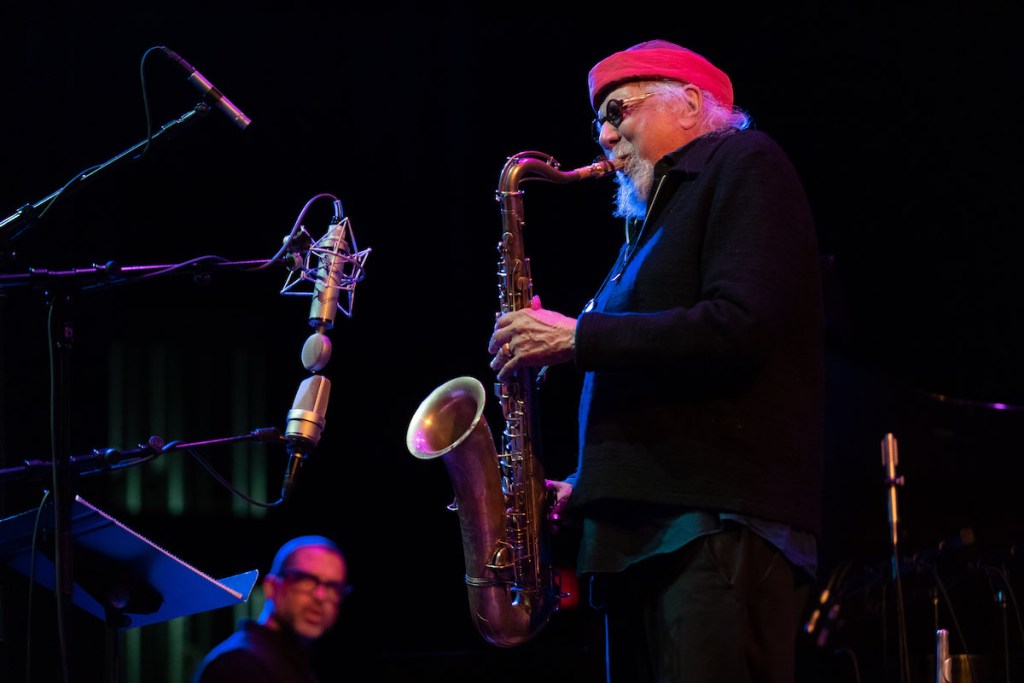Veteran jazz saxist Charles Lloyd, on the cusp of his 85th birthday, returned to the scene of many significant musical moments by bringing his quartet to the Lobero Theatre last Friday night. It was an auspicious occasion, and as promoter Stephen Cloud told the audience, this was the Montecito-based musician’s 19th appearance in the accommodating ambience of this hometown haunt, itself currently glowing in a milestone birthday moment, at age 150.
This house has had a rare intimate role — relationship, even — with Lloyd’s long and uncommonly wending musical life. Their artist-venue bond goes back to the saxist’s return to action after a 15-year hiatus and self-imposed exile from the outside music world between Lloyd’s late ‘60s zenith and his renascence in the mid-‘80s. Since then, when he performed with the young French piano sensation Michel Petrucciani, he has appeared in countless settings at the Lobero, including with his more pop-soul flavored group the Marvels (with Bill Frisell, Hollister Rancher Greg Leisz and guest singer Lucinda Williams) and the “Sangam” trio, with tabla master Zakir Hussain and drummer Eric Harland, recorded by Santa Barbara Sound Design’s Dom Camardella for an ECM release in 2008.
Lloyd even found his way into the shuttered Lobero during the COVID lockdown, creating a memorable live-streamed show. That trio show, with Gerald Clayton and Anthony Wilson, seemed like a warm-up for last year’s triple release of intimate trio albums, Chapel, Ocean, and Sacred Ground.
In many ways, last week’s show was like old home week for Lloyd, returning with the Coltrane-esque acoustic quartet format that has largely defined his 60-year career as a leader, but with at least one important twist. While he has performed with the subtle, brilliant, and always-fascinating pianist Jason Moran since 2008, and occasionally worked with bassist Larry Grenadier (a mainstay with Brad Mehldau for many years among other high-profile contexts), this Lobero visit marked Lloyd’s first time out with drummer Brian Blade, considered by many (including this listener) as among the finest and most ear-attuned drummer in jazz of the now.
Blade had appeared as part of the recently belated jazz icon Wayne Shorter’s quartet for many years, including a stop at the Lobero, and the drummer owned a special spotlight at the latest Lloyd/Lobero (Lloyd-bero?) affair. Many of our eyes and ears were on the lithe man behind the drum kit, wondering how he would connect with the expansivity-minded Lloyd. Blade mostly erred on the side of folding into the context in the midst of collectively unfolding, which he did, organically, from the concert opener “Requiem” forward.
Against a visually lyrical backdrop of artwork by Lloyd’s wife/manager/photographer Dorothy Darr and winsome nature scenery, the tall, restlessly mobile Lloyd appeared stylishly (as usual) all in black, topped by a red chapeau. He said nothing on this night, but opted to let the music speak, which it did, flexibly and flowingly. He smiled appreciatively as the crowd busted out into a round of “Happy Birthday” and gestured warmly to his fellow musicians throughout the night, as each contributed greatly to the integrated whole, in a finely calibrated way — and with an intentional looseness led by Lloyd’s expressive impulses, on tenor sax and sometimes flute.
Lloyd is an explorer by instinct, always dream weaving his way around the melodic structures of his mostly original set list (apart from the hymn “Lift Every Voice” and the balladic exhalation of the Mexican folk song “La Llorona (the weeping woman)” as an encore). He tends to lead his quartet as a benevolent spirit guide rather than a dictatorial figure front and center, and some of the more engaging moments of the concert came in the form of ensemble wanderings, with free-spirited, collective improv passages leading into definable.
As it happened, the unscripted but called-for “Happy Birthday” outburst was the most openly celebratory and “feel good” moment of a night which often waxed meditative and introspective, although energies lifted and swayed. The climax came with the quirkily swinging, Thelonious Monk-like turf of “Monk’s Dance,” an angular high-stepping set-closer. Over the course of the 90-minute set, Lloyd also managed to inject other personal nods to masterly jazz voices he has thronged to in his life and musical palette, whether Billie Holiday’s voice of longing and languor in his tune “Ghost of Lady Day” or the special and short-lived trumpet eloquence of his old friend Booker Little, a friend from his early Memphis days, with the tune “Booker’s Garden.”
In recent years, since his 80th birthday concert at the Lobero (released as a Blue Note album), Lloyd has enjoyed new heights of respect from the jazz world, as a still-active and forward-going elder statesman from an era whose pillars are disappearing (such as the recently belated icon Shorter). At his latest Lobero show, at 85, Lloyd further fed into the sense of community continuity he has built up in this room, over the second half of his strange, trippy musical saga. He and his comrades delivered, with spiritual equipoise, jazz legacy and chops in check.

